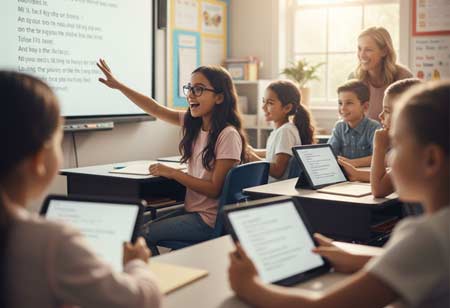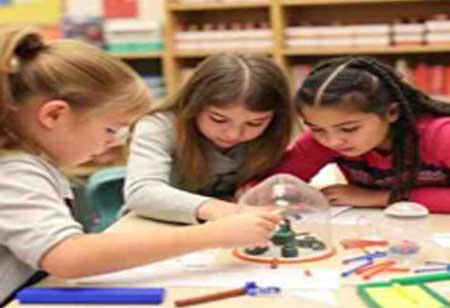THANK YOU FOR SUBSCRIBING
Be first to read the latest tech news, Industry Leader's Insights, and CIO interviews of medium and large enterprises exclusively from Education Technology Insights
The Evolving Landscape of Educational Tourism
The field of education is experiencing a transformative change, paralleled by the expansion of tourism.

By
Education Technology Insights | Wednesday, March 27, 2024
Stay ahead of the industry with exclusive feature stories on the top companies, expert insights and the latest news delivered straight to your inbox. Subscribe today.
Educational tourism is undergoing a transformative shift, evolving beyond traditional boundaries. It now encompasses experiential learning, cultural immersion, and global collaboration, offering participants multifaceted educational experiences in diverse settings.
FREMONT, CA: The field of education is experiencing a transformative change, paralleled by the expansion of tourism. The concept of educational tourism goes beyond typical ideas of leisure and sightseeing travel. It centres on learning and growing while taking in new surroundings, customs, and sceneries. Engaging in seminars, lectures, or practical experiences, educational tourism provides a distinctive fusion of knowledge acquisition and exploration.
Experience Learning: One of the main trends in educational tourism is the shift towards experience learning. Travellers are looking for immersive events, workshops, and hands-on experiences that will help them connect with the subject matter. Experiential learning provides a richer and more memorable educational experience, whether it is taking part in wildlife conservation initiatives or learning traditional cooking techniques in a foreign culture.
Sustainable and Responsible Travel: As environmental awareness rises, educational tourism relies heavily on sustainable and responsible travel strategies. Tourists are becoming more aware of their environmental footprint and how their explorations affect the places they visit. Eco-friendly lodging options, community-based tourism projects, and educational activities emphasising ethical and ecological principles have all increased due to this trend.
Cultural Immersion: The motivation behind educational tourism is cultural immersion. To learn more about other cultures, tourists are keen to interact with local populations, customs, and languages. Staying with local families, engaging in language exchange initiatives, and immersing oneself in indigenous communities offer invaluable chances for genuine cultural encounters, enhancing the educational journey.
Digital Integration: The educational tourism field is changing due to technology. Through the provision of historical reconstructions, interactive lessons, and virtual tours, digital tools such as augmented reality, virtual reality, and interactive apps improve education. By bridging the gap between classroom instruction and hands-on learning, these innovations improve the accessibility and engagement of educational information.
Personalisation: Personalised educational trips are replacing standardised travel plans. Travellers can customise their journeys according to their learning objectives, interests, and preferences. Sophisticated algorithms evaluate information to generate personalised travel schedules that correspond with personal learning goals, guaranteeing a more significant and pertinent experience.
Lifelong Learning: Educational tourism now extends beyond traditional student demographics to encompass lifelong learners, such as professionals and retirees, who are eager to broaden their knowledge and skills while discovering new destinations. In response, suppliers of educational tourism are extending their offerings to include a range of age groups and interests.
Cross-disciplinary Learning: Educational tourism mirrors the trend of blurred boundaries between different fields of study. Travellers are searching for interdisciplinary educational opportunities that bring together different themes, like science and art, technology and history, or ecology and anthropology. These interdisciplinary methods promote comprehensive understanding and present new viewpoints.
International Collaborations: Educational tourism is cultivating global collaborations among institutions, educators and learners. Globally dispersed individuals are collaborating on joint workshops, research initiatives, and exchange programmes. These partnerships facilitate cross-cultural communication and also improve global knowledge.
Travel that is responsible and sustainable is intrinsically linked to the future of educational tourism. Programmes for educational tourism will incorporate ethical practices as visitors become aware of their influence on the environment and local communities. Travelling for educational purposes will allow people to collaborate internationally and overcome distances. There will be an increase in the number of collaborative learning programmes, which bring together students from various backgrounds for shared educational experiences. In an increasingly globalised society, this cross-cultural exchange will foster a sense of interconnectedness in addition to fostering cultural awareness.
A fascinating fusion of knowledge acquisition, technology innovation, cultural immersion, and responsible exploration characterises educational tourism in the future. This trend has the potential to completely transform the tourism and education sectors as it picks up steam. With personalisation at its heart and technology acting as a facilitator, educational tourism is poised to fundamentally alter the perspectives of the world, the ability to learn from it, and the ability to improve it.







